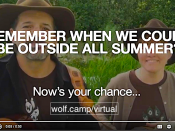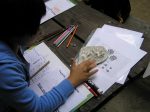… Continued from Teaching Nature Part III – Preparing & Leading Classes, Camps, Lessons & Programs
 Responsibility: The Ability To Respond
Responsibility: The Ability To Respond
In the fall of 1994 my path lead from employment at Sea Mar Community Health Centers as a Level II Certified Chemical Dependency Counselor with youth specialist credential, to the start of my self-employment career. At the time, I was a jack of all trades, master of none, but I was not yet ready for the perfect job among people like that, which is of course teaching. I had also been doing a lot of volunteer work with homeless people on the streets of Bellingham, so I took a drama therapy training course which brings audience members into improvisational situations having to do with complex issues.
I loved working with kids as well as adults on improvisational drama therapy, so I started my own production called “Responsibility: The Ability To Respond.” Needless to say, it was not a money maker, and it was a challenge to help participants balance between sharing and over-sharing, and even more of a challenge working with youth and parents facing conflict and complex relationship issues.
I tell that story now because as a teacher, you will always face new problems, so there is an endless list of tips and tricks of the trade to put up your sleeve, ready to pull out on the spot – ready to be response-able, but remember to be age-appropriate and diagnosis-appropriate.
Tips & Tricks of the Teaching Trade
Preventative Medicine:
- Go over rules/agreements before starting;
- Never promise anything you have any chance of not delivering;
- “It’s all in the prep” so “prep, prep, prep”
- Comment below or email me to extend or amend this list!
Group Facilitation:
- Talking stick;
- Go in order of the circle, left to right, or right to left;
- Practice, practice, practice!
- Comment below or email me to extend or amend this list!
Transitions:
- Have an assistant get the kids to play a game during transitions so that the Lead Instructer can set things up;
- Get students to help carry stuff and give pizza for doing things fast:)
- Comment below or email me to extend or amend this list!
Rewards:
- Acknowledge good behavior, in private or sometimes in front of group if it doesn’t cause envy;
- Give them dark chocolate if allowed in their nutritional desciption;
- Let them play a game;
- Next time you get to go first!
- Tell a story;
- Comment below or email me to extend or amend this list!
Consequences:
- Push ups for fun!
- Tree pose;
- Carry my stuff;
- Run somewhere and back;
- Sit out (be sure to bring back way before they ask to be brought back)
- Make them stand next to you;
- Extra Work (such as collecting lost and found for the day)
- Have them go last;
- Ask students to remind you of the agreements/rules;
- Comment below or email me to extend or amend this list!
Motivation Issues:
- Electrolyte Blast! (Give mouthful of gatoraid, which gives kids “special powers” of strength, speed, and endurance)
- Joyfully scare/surprise kids who fall behind to make them walk faster;
- Barter for resources (ex. trade three cleaned thistle stalks for first water refill, bundle of pencil lead for second bottle, make a trap/or cordage trade for salami slice) promise story time or other activities in exchange for hard work (piles of X height of debris, working hard for X amount of time, etc)
- Comment below or email me to extend or amend this list!
Heat Related Issues:
- 5 minute power nap!
- Meditation with story!
- Do not run;
- Mandatory water drinking circle;
- Spritz with spray bottle;
- Comment below or email me to extend or amend this list!
Injury Distraction:
- “Walk it off” if okay;
- Applaud toughness while also allowing pain expression;
- Comment below or email me to extend or amend this list!
Friends Talking / Cliquiness:
- Separate them into different groups;
- Stand between them;
- Comment below or email me to extend or amend this list!
Clingyness:
- Remind them about other people’s personal boundaries;
- Comment below or email me to extend or amend this list!
Shyness:
- Not forcing them to be extroverted;
- Give them opportunites to be social with other kind of shy children;
- Give space to share during questions (count to 10 before moving on)
- Be quiet with them–if just sitting at lunch or for a break, stand or be near them without asking questions or trying to make them talk;
- Comment below or email me to extend or amend this list!
Raising Hand to Tell Stories Instead of Asking Legit Questions:
- Ask if its a question or story before they are allowed to speak;
- Limit the number of questions with set counts;
- Comment below or email me to extend or amend this list!
Impulse Control Issues:
- Hold their hand;
- Challenge them to see how long they can stay within 5 feet of you;
- Use a timer;
- Initiate hand signals;
- Comment below or email me to extend or amend this list!
Advanced Teaching Tips for Special Situations
Phobias:
- Show them how their fear can be overcome;
- Allow for phobias and distract them;
- Comment below or email me to extend or amend this list!
Obsessive Compulsive Disorder (OCD):
- Learn their routines, and be respectful of them;
- Distraction from compulsive behavior;
- Comment below or email me to extend or amend this list!
Aspergers and Autism:
- By all means, stick with the plan;
- Reminding them about their contribution to the group;
- Giving only two choices, rather than many options;
- Don’t argue with them, but be authoritative but definitely only if you knowledgeable about which you speak, otherwise be absolutely sure to admit you don’t know something;
- Constant contact with them to gently remind them what project they need to continue working on;
- Comment below or email me to extend or amend this list!
ADHD & ADD:
- Limit the number of questions with set counts and consequence;
- Keep to a good sleep and eating schedule;
- Comment below or email me to extend or amend this list!
Chronic Depression & Acute Grief:
- Distractions showing life must go on;
- Healthy expression at appropriate length of time following loss;
- Counseling with trained staff member or the director;
- Comment below or email me to extend or amend this list!
Other Mental Illnesses:
Monitor medications closely and follow family directives on teaching the student. In the case of untreated mental illnesses including bipolar disorder and schizophrenia, for example, or any antisocial personality disorders such as psychopathy, sociopathy, or lack of sexual impulse control especially attraction to children: Do not accept into program, or if discovered during program, remove and send home.
Chris Chisholm founded Wolf Camp in 1996, and he is author of the Wolf Journey Earth Conservation Courses. He grew up in the north woods of Minnesota, spent his high school years in Germany and tromping around the Alps, studied in the Ecuadoran Andes for his college junior year abroad, and moved to the west coast after earning a B.A. from the University of Wisconsin in 1991. From 1992-95, Chris worked as a Level II Certified Youth Counselor at Sea Mar Community Health Centers. He taught Spanish from 1995-97 at the Whatcom Hills Waldorf School, and was an active member of the Whatcom County Chapter, Washington State Music Teachers Association from 1996-2003. In addition to running Wolf Camp and the Conservation College, he has taught for the The Mountaineers, North Cascades Institute, Sierra Club and various other organizations up and down the west coast. Chris is considered an inspirational storyteller, musician, teacher, counselor, outdoorsman, conservationist, cooperative businessman, and friend to all who have shared time with him at Wolf Camp.
To learn how to teach in the outdoors, spend a summer training in our hallmark program: the Conservation College Earth Skills Teaching Apprenticeship.










